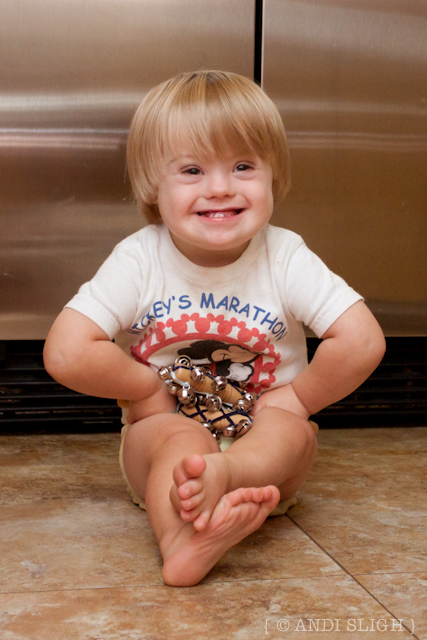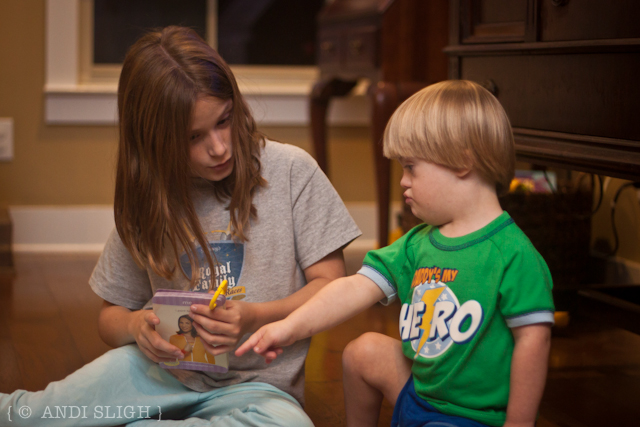
The list of “bad stuff” related to Down syndrome is long and depressing.
Heart conditions, vision problems, hearing problems, increased risk of leukemia, thyroid problems, and, of course, mental retardation (or, if you prefer, cognitive delay or intellectual disability). As if the list of “bad stuff” wasn’t enough, each person with Trisomy-21 (T21) is marked from birth with a set of physical characteristics that announce the condition with a visual megaphone.
Many of the features common to those with T21 are found in my family (and me specifically). I have the palmar crease. I’m short (and apple shaped!) My pinky finger even curves inward. I have straight hair, although it’s thick, not thin like is common for people with T21 (Nathan has the same thick hair). Perhaps he would have had many of those features even without the extra chromosome.
I’m not ashamed to admit that the last item in that list above – mental retardation/cognitive delay/intellectual disability is the one that worries me the most. Although it may, in the long run, impart to him a special kind of innocence that we all need a great deal more of today, it is also the one aspect of Down syndrome that puts him most at risk in a cruel world.
But what if Nathan didn’t have any of the physical signs of Down syndrome? Would I (and others) expect more from him?
Nathan will age out of early intervention in March, so we recently started the transition process for public preschool. I’m concerned that he may not qualify when they test him (the requirements are to be a minimum of either two deviations below the mean in one area or one deviation below the mean in two areas). If he doesn’t, it won’t be the end of the world – private preschool is still an option, and has so far been a good experience for all of us. And as Mr. Andi and I have said for almost a decade now – the world isn’t special, it’s typical. Our kids must learn to get along in the real, typical world.
But if he doesn’t qualify, it will be bitterly ironic, because Sarah Kate qualified easily due to her significant gross motor delay (which has not affected her schooling in the years since in any way). Nathan also automatically qualified for early intervention based solely on his diagnosis, which will make it an even more bitter pill to swallow if he is denied preschool services – especially knowing that Sarah Kate is receiving gifted education (which sounds really impressive but if I’m being honest I wouldn’t give a rip if it disappeared tomorrow).
But what if everything we’ve been told (and believed) is wrong?
Nathan has a form of T21 called mosaic Down syndrome, which means that not all of his cells have an extra 21st chromosome. Without extensive biopsies of all areas of his body, there’s no way to know how many of his cells are affected (the percentage of affected blood cells may not match the percentage of skin cells, and so on). People with mosaic Down syndrome may have all of the problems associated with T21, none of them, or somewhere in between, and as a result, doctors treat them in the same way they treat any child with “full” T21. For the most part, Mr. Andi and I have done the same thing.
But sometimes I wonder if, other than the visible physical features, Nathan will have that many of the typical T21 issues as he grows up. He has never had any of the problems so common to young ones with T21 – heart conditions, GI issues, thyroid problems, and the like. Nathan was delayed in walking, but not unreasonably so. In almost every area of development he has tested in the normal range for the past two-and-a-half years.
The area in which he needs the most help is in speech, and primarily in articulation. However, articulation goals aren’t even allowed in the IFSP for early intervention, because it’s common for children to have problem with articulation at this age. His pediatrician commented one time that although he does have lower than normal tone, if she wasn’t looking at him she wouldn’t think it was unusual. His articulation is likely related to that low tone, though both his expressive and receptive language skills are good (expressive is weaker, because of his articulation issues, which are likely related to having lower tone).
And then there’s The Other Thing.
Nathan knows all of his letters, as well as his numbers up to ten. I’m not sure how long he’s known them, because I never worked with him on them. We discovered it by accident back in September. Since making this discovery, we’ve bought flash cards for both (in addition to his baby sign language flash cards) and he loves them. Seriously. He’d do flash cards all day long if we were willing.

It’s not that I think Nathan is a Boy Wonder because he knows his letters – many kids don’t learn them before they turn two-and-a-half, but some do. The thing is…we didn’t try to teach him his letters. It never occurred to me that he’d learn them earlier than many typical kids. I wonder if I would have even noticed if his speech therapist hadn’t said, “Why don’t you test him and see how many he knows?” The answer, of course, was All of Them.
If Nathan could have inherited so many physical characteristics from me, could the same genes that combined to place Sarah Kate in the gifted program have combined to make Nathan smart, as well? Is it possible that the affects of the unknown percentage of extra T21 chromosomes could be outweighed by a predisposition without them to be gifted?
I think most parents of kids with T21 would admit that they hope (or hoped, when their child was small) that their child will be the one who exceeds expectations. The one who defies the odds. The one who proves to the world that people with Down syndrome are capable of so much more than society believes they can achieve. I’m not ashamed to admit that I’m one of those parents, although I constantly remind myself that even though I don’t see them, there are limits, and that we just haven’t reached them yet.

Hi, I live in Australia and have been following your blog for a few months. My little boy Charlie is 7 months and has DS. Firstly I like your honest style compared with some blogs that make you feel inadequate for ever having a dark thought! You iterate what probably most parents who have a child with DS think ie “will my child be the one who defies the odds”. Thinking back that is how it was presented us as new parents- “some children with DS have normal intellect, attend university etc etc”. I too watch and wait to see how my son develops. Thus far, right on cue, nothing really sets him apart from his peers and we haven’t had any health issues to date. But there is always that lingering worry of what will (or won’t) come next. That’s the annoying thing about diagnoses, they add anticipatory grief and worries to the equation of the normal parenting worries. In some ways I wish we didn’t even know about his diagnosis as all it does is make us worry instead of purely celebrating his existence.
Thanks again for the honesty!
You’re welcome, Kylie, and thank you for your comments! I do try to be honest because if I never read about anyone else struggling I’d either be unable to relate to them or I’d think they weren’t telling the truth, and I don’t think either of those would be helpful to me.
I’m not that much further down the T21 road than you are, in the grand scheme of things, but one thing that I have noticed is that the feeling that I’m waiting for the other shoe to drop has never gone away, but it has diminished a good deal. I imagine it’s something that will ebb and flow through the years. And I completely agree with you about wishing I didn’t know. I wonder how our lives would have been different these past two-and-a-half years if no one had ever told us.
I’m not writing to bash on you. I also have a child with DS. I’m surprised that for a person that seems so positive and believing, sometimes it seems like you are afraid to fully believe and dream for you little guy. Let go of fear and “ifs”. Give your child the space and wings to fly as high as he wants to. Whatever hight he goes, that’s ok. Just let him know that you believe in him and will support him if flying to infinity is his desire, Down syndrome or not.
I believe you are great parents. Great job.